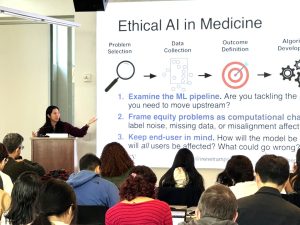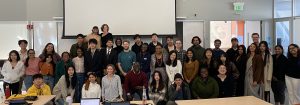Giving a man a fish is good. Teaching a man how to fish is better. Yet, fishing is useless without a river. According to Dr. Kurt Kornbluth, the history of development is filled with examples of good intentions with sufficient capital but insufficient preparatory research and little follow-up to devise the most sustainable solutions. To counter such well intentioned by uninformed development work, Kornbluth founded the D-Lab at the University of California, Davis, with support from the Blum Center for Developing Economies.
D-Lab stands for Development through Dialogue, Design and Dissemination and aims to improve living standards of low-income households by creating and implementing appropriate, sustainable low-cost technologies. Inventor and educator Amy Smith launched the first D-Lab at the Massachusetts Institute of Technology (MIT). During the developmental stages of the initiative in 2005 Kornbluth, then a PhD student in Mechanical Engineering at UC Davis, assisted her Smith during the developmental stages of the initiative in 2005. Since then, MIT’s program has successfully grown to offer sixteen different courses, exploring development, design and social entrepreneurship. Following the success of MIT’s D-Lab, Kornbluth wanted to bring the program to UC Davis; after finishing completed his graduate work and then embarked upon a mission to establish his own D-Lab at UC Davis.

Focusing on issues such as off-grid power, post harvest crop preservation, irrigation, and renewable energy, the D-Lab at UC Davis offers two hands-on courses for graduate and undergraduate students at the intersection of energy and international development. The first course gives an overview of development work around energy, while the second provides students with a platform to design for the energy market. As part of the class, D-Lab students are directly coupled with clients who face a specific problem. They spend ten to twenty weeks working with these clients in different parts of the world—from Zambia and Nigeria to Bangladesh, India and Nicaragua—to offer concrete solutions.
“Students at the D-Lab always work with real problems and real people,” Kornbluth explained in an interview. The students’ designs don’t remain in academia but directly impact people in the field. Clients get answers—students gain real-life experience.
Throughout the process— rainstorming and narrowing ideas and transforming feasible solutions into real pilot projects—sustainability is the number one priority. All projects must take into account what Kornbluth calls the “four lenses of sustainability:” environmental, economic, social, and technical. In two project-review sessions per quarter, practitioners, academics and peers provide students constructive, often hard-edged feedback. Most D- lab students are graduate students from different fields and disciplines, including engineering, economics, international development. This diversity allows students to learn from each other as much as from the process of designing a sustainable energy solution.
While it is crucial to carve out a concrete and substantial project within the time period of the course, some of the more successful solutions have stayed with students beyond their D-Lab experience. One D-Lab graduate used the “SMART light” prototype he had developed in D-Lab as part of his portfolio when applying to a job after graduation. Another student recently received $40,000 from “Start up Chile,” a government- sponsored program designed to draw start-up technology companies to the country, to further his efforts in bringing safe water to Chile.
Despite the successes, Kornbluth humbly admits that, as in any field, not all projects work out great. “In D-lab Maybe 25% are a total flop, 25% will be mediocre and about 50% are really good,” Kornbluth said.
But those innovators who are successful create real impact—especially when they get together. The UC Davis D-Lab is part of the International Development Design Summit (IDDS) network. Once a year, 60 to 80 practitioners from around the world assemble for a different kind of academic conference. Under the banner of co-creation, students, teachers, professors, economists, engineers, mechanics, doctors, farmers and community organizers present technology and enterprise prototypes instead of academic papers. Meeting in Kumasi, Ghana, and Sao Paulo, Brazil, in 2012, IDDS leaders intend to launch additional locally organized summits in 2013. The goal is to turn these meetings into regular, university-based innovation hubs to exchange technology ideas.
Feasible, applicable and replicable solutions reach far, but networks are also of great importance. Since the beginning, UC Davis and MIT have been collaborating in developing the D-Lab curriculum, and they are looking for other universities to adopt the D-Lab model. “D-Lab is really about new technologies, and working with them in context. But it’s also about curriculum and it’s about networks,” Kornbluth explained.
In a university consortium with MIT, the D-Lab has just become part of a greater, brand-new network: the USAID Higher Education Solutions Network that was launched on November 9th 2012. In this 5-year partnership with seven top U.S. and foreign universities (among them, UC Berkeley), this initiative will harness the best ideas to fight poverty through development laboratories similar to the D-Lab. If this new generation of development professionals learns how to research, design, test and scale up effective development technologies, there is reason to hope that there will be no more fishing without water in international development.
Curious about the Higher Education Solutions Network and the new partnership between USAID and UC Berkeley? Read “Big Ideas In a Box” by Luis Flores for more information.






